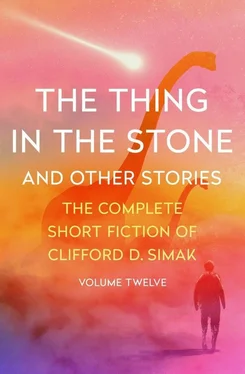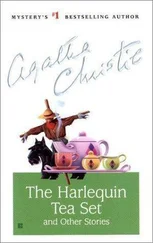The face of Univac faded and Harrison rose from his chair and went into the living room.
“It was a hard day, sir,” said Harley.
“Yes, Harley, I think you could call it that.”
“And now another drink?”
“That would be very fine.”
“You are sure that is all.”
“Quite sure. No beach, no ski slope, no…”
“I am aware of that,” said Harley, hastily. “I thought perhaps a little music.”
“I want to think,” Harrison said, sharply.
“But man has thought so long,” said Harley, “of so many things.”
“That is right,” said Harrison, “and he’s never going to quit. The best that he can hope for is a little help to keep his thinking straight.”
He sat in the chair in the tiny living room, with the drink in hand.
Sellout, he wondered, or a big stride forward?
“The Creator” was the only piece of fiction Clifford D. Simak had published between November 1932 and July 1938. In later years, several different theories would be floated about the science fiction world in efforts to explain his apparent retreat, but I will not go into them here, except to suggest that the very existence of this story probably owes much to some of the same forces that resulted in Cliff’s absence from the field.
“The Creator” was written in 1933, at a time when Astounding had temporarily suspended publication and both Wonder Stories and Amazing were skipping months, seemingly teetering on the edge of extinction—the Great Depression had been going on for some time, too—and Cliff would later tell Sam Moskowitz (as quoted in the latter’s book Seekers of Tomorrow , 1965) that he had not given up on science fiction, but that he felt at the time that there was no longer a market. But Cliff had been approached by William H. Crawford, who aspired to start a new science fiction magazine—a “literary” one—but could not offer payment for stories other than a lifetime subscription … in short, his planned publication was at that point little more than a fanzine.
Cliff had been, and would continue to be, involved in the world of science fiction fandom, but he was a professional writer, and likely would have dismissed Crawford’s overture, except for Cliff’s belief that the market for science fiction had crashed. “‘Had there been a market,’” Cliff told Moskowitz several decades later, “‘the story would never have been written, for I would have slanted for that market.’” But Cliff let Crawford have the story, he said, “‘out of sheer admiration for any man with guts enough to try a new science fiction magazine.’”
The story was published in the March-April 1935 issue of Crawford’s Marvel Tales , and it probably was not seen by more than a few hundred people. But, crude as it was, it seems quickly to have obtained a reputation as a groundbreaking story, as a defiance of publishing taboos. Various reprints appeared over the years.
For all of its iconoclastic reputation, however, “The Creator” was not a complete break from Cliff Simak’s previous writings; in fact, it fits neatly into the body of his exploration of religious thought: It was an extension of ideas that appeared in the author’s very first published story, “The World of the Red Sun,” and Cliff would return, time and time again, to the theme of religion and the ultimate meaning of the universe.
—dww
This is written in the elder days as the Earth rides close to the rim of eternity, edging in nearer to the dying Sun, into which her two innermost companions of the system have already plunged to a fiery death. The Twilight of the Gods is history; and our planet drifts on and on into that oblivion from which nothing escapes, to which time itself, ageless as it may seem to us, may be dedicated in the final cosmic reckoning.
Old Earth, pacing her death march down the corridors of the heavens, turns more slowly upon her axis. Her days have lengthened as she crawls sadly to her tomb, shrouded only in the shreds of her former atmosphere. Because her atmosphere has thinned, her sky has lost its cheerful blue depths and she is arched with a sorrowful grey, which hovers close to the surface, as if the horrors of outer space were pressing close, like ravening wolves, upon the flanks of an ancient monarch of the skies. When night creeps upon her, stranger stars blaze out like a ring of savage eyes closing in upon a dying campfire.
Earth must mourn her passing, for she has stripped herself of all her gaudy finery and proud trappings. Upon her illimitable deserts and twisted ranges she has set up strange land sculptures. And these must be temples and altars before which she, not forgetting the powers of evil and good throughout the cosmos, like a dying man returning to his old faith prays in her last hours. Mournful breezes play a hymn of futility across her barren reaches of sand and rocky ledges. The waters of the empty ocean beat out upon the treeless, bleak, age-worn coast a march that is the last brave gesture of an ancient planet which has served its purpose and treads the path to Nirvana.
Little half-men and women, final survivors of a great race, which they remember only through legends handed down from father to son, burrow gnome-like in the bowels of the planet which has mothered their seed from dim days when the thing which was destined to rule over all his fellow creatures crawled in the slime of primal seas. A tired race, they wait for the day their legend tells them will come, when the sun blazes anew in the sky and grass grows green upon the barren deserts once again. But I know this day will never come, although I would not disillusion them. I know their legends lie, but why should I destroy the only solid thing they have left to round out their colorless life with the everlasting phenomena of hope?
For these little folks have been kind to me and there is a blood-bond between us that even the passing of a million years cannot erase. They think me a god, a messenger that the day they have awaited so long is near. I regret that in time to come they must know me as a false prophet.
There is no point in writing these words. My little friends ask me what I do and why I do it and do not seem to understand when I explain. They do not comprehend my purpose in making quaint marks and signs upon the well-tanned pelts of the little rodents which overrun their burrows. All they understand is that when I have finished my labor they must take the skins and treasure them as a sacred trust I have left in their hands.
I have no hope the things I record will ever be read. I write my experiences in the same spirit and with the same bewildered purpose which must have characterized the first ancestor who chipped a runic message upon a stone.
I realize that I write the last manuscript. Earth’s proud cities have fallen into mounds of dust. The roads that once crossed her surface have disappeared without a trace. No wheels turn, no engines drone. The last tribe of the human race crouches in its caves, watching for the day that will never come.
CHAPTER ONE
First Experiments
There may be some who would claim that Scott Marston and I have blasphemed, that we probed too deeply into mysteries where we had no right.
But be that as it may, I do not regret what we did and I am certain that Scott Marston, wherever he may be, feels as I do, without regrets.
We began our friendship at a little college in California. We were naturally drawn together by the similitude of our life, the affinity of our natures. Although our lines of study were widely separated—he majored in science and I in psychology—both of us pursued our education for the pure love of learning rather than with a thought of what education might do to aid us in earning a living.
Читать дальше












